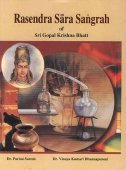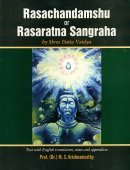Manikya, Māṇikya, Māṇikyā: 21 definitions
Introduction:
Manikya means something in Hinduism, Sanskrit, Jainism, Prakrit, Marathi, biology. If you want to know the exact meaning, history, etymology or English translation of this term then check out the descriptions on this page. Add your comment or reference to a book if you want to contribute to this summary article.
Manikya has 19 English definitions available.
Languages of India and abroad
Sanskrit dictionary
[Deutsch Wörterbuch]
Source: Cologne Digital Sanskrit Dictionaries: Böhtlingk and Roth Grosses Petersburger WörterbuchMāṇikya (माणिक्य):—
1) n. [Amarakoṣa 3, 6, 3, 31.] = maṇika gaṇa caturvarṇādi zu [Pāṇini’s acht Bücher 5, 1, 124, Vārttika von Kātyāyana. 1.] = maṇi [Hemacandra’s Abhidhānacintāmaṇi 1063,] [Scholiast] Rubin: pakvadāḍimabījābhaṃ māṇikyaṃ śikharaṃ viduḥ [UJJVAL.] zu [Uṇādisūtra 4, 117.] [Kullūka] zu [Manu’s Gesetzbuch 9, 286.] [Spr. 626. 3021. 3683.] [VṚDDHA-Cāṇakya 16, 10.] [Ānandalaharī 42. 64. 73.] [WEBER, Nakṣ. 2, 391, Nalopākhyāna 1.] [Kathāsaritsāgara 26, 44.] [PAÑCAR. 1, 1, 73. 7, 49. 4, 1, 34.] [Pañcatantra 207, 23.] Inschr. in [Journ. of the Am. Or. S. 6, 543, 7.] Vgl. raṅga . —
2) f. ā eine kleine Hauseidechse [Hemacandra’s Abhidhānacintāmaṇi 1298.] —
3) m. Nomen proprium eines Mannes [Rājataraṅgiṇī 8, 180.]
Source: Cologne Digital Sanskrit Dictionaries: Sanskrit-Wörterbuch in kürzerer FassungMāṇikya (माणिक्य):——
1) n. Rubin [Rājan 13,6.146.] —
2) *f. ā eine kleine Hauseidechse. —
3) m. Nomen proprium eines Mannes.
Sanskrit, also spelled संस्कृतम् (saṃskṛtam), is an ancient language of India commonly seen as the grandmother of the Indo-European language family (even English!). Closely allied with Prakrit and Pali, Sanskrit is more exhaustive in both grammar and terms and has the most extensive collection of literature in the world, greatly surpassing its sister-languages Greek and Latin.
See also (Relevant definitions)
Starts with (+10): Manikya maithila, Manikya suri, Manikya-bhandara, Manikya-bija, Manikyabhamdari, Manikyabhavana, Manikyacandra, Manikyacandra suri, Manikyacandraka, Manikyadeva, Manikyaditya, Manikyadri, Manikyamala, Manikyamalla, Manikyamaya, Manikyamishra, Manikyamukha, Manikyamukuta, Manikyan, Manikyana-gida.
Ends with: Amaramanikya, Chandomanikya, Chhandomanikya, Garudamanikya, Halumanikya, Hanumanikya, Jinamanikya, Kshamamanikya, Mukutamanikya, Nilamanikya, Rangamanikya, Ratnamanikya, Viramanikya, Vivekamanikya.
Full-text (+67): Rangamanikya, Manikyaratna, Manikyapunja, Manikyasuri, Manikyamukuta, Manikyamukha, Manikyadeva, Manikyamishra, Manikyacandraka, Manikyaraya, Manikyamala, Manikyamaya, Manikyamalla, Manikya maithila, Manikka, Prashnamanikyamala, Vrittamanikyamala, Garudamanikya, Manikya suri, Manikyadri.
Relevant text
Search found 21 books and stories containing Manikya, Māṇikya, Māṇikyā; (plurals include: Manikyas, Māṇikyas, Māṇikyās). You can also click to the full overview containing English textual excerpts. Below are direct links for the most relevant articles:
Rasa Jala Nidhi, vol 3: Metals, Gems and other substances (by Bhudeb Mookerjee)
Chapter XV - Gems (3): Manikya (ruby)
Part 1 - Characteristics of Ruby (manikya) < [Chapter XV - Gems (3): Manikya (ruby)]
Dasarupaka (critical study) (by Anuru Ranjan Mishra)
Part 7 - Characters in the Mudritakumudacandra < [Chapter 10 - Prakaraṇa (critical study)]
Part 9 - Sentiments (rasa) used in a Prakaraṇa < [Chapter 10 - Prakaraṇa (critical study)]
Part 2 - Summary of the drama (Mudritakumudacandra) < [Chapter 10 - Prakaraṇa (critical study)]
Bhakti-rasamrta-sindhu (by Śrīla Rūpa Gosvāmī)
Verse 4.3.36 < [Part 3 - Chivalry (vīrya-rasa)]
Cosmetics, Costumes and Ornaments in Ancient India (by Remadevi. O.)
1.2. Materials (c): Padmarāga (Ruby) < [Chapter 3 - Ornaments]
2.5. Hand Ornaments (c): Valaya < [Chapter 3 - Ornaments]
Chaitanya Bhagavata (by Bhumipati Dāsa)
Verse 2.19.204 < [Chapter 19 - The Lord’s Pastimes in Advaita’s House]
Trishashti Shalaka Purusha Caritra (by Helen M. Johnson)
Appendix 6.2: new and rare words < [Appendices]
Part 3: Mahāvīra’s childhood < [Chapter II - Mahāvira’s birth and mendicancy]
Appendix 1.6: New and rare words < [Appendices]
Related products




